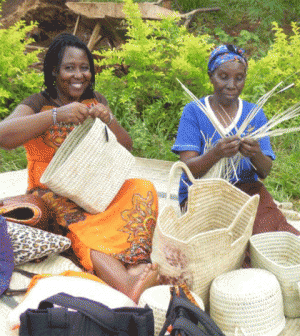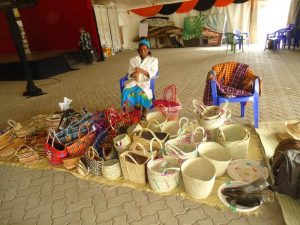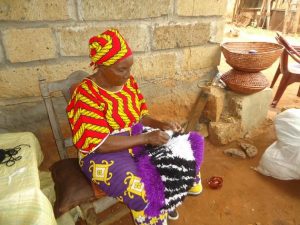- Finding Unshakable Power in a World That Wants to Pull Us ApartPosted 5 months ago
- What could a Donald Trump presidency mean for abortion rights?Posted 5 months ago
- Financial Empowerment: The Game-Changer for Women in Relationships and BeyondPosted 6 months ago
- Mental Health and Wellbeing Tips During and After PregnancyPosted 7 months ago
- Fall Renewal: Step outside your Comfort Zone & Experience Vibrant ChangePosted 7 months ago
- Women Entrepreneurs Need Support SystemsPosted 7 months ago
The elderly Kenyan women weaving their way to a more sustainable future

By Caroline Wambui | Thomson Reuters Foundation
“Basketry has not only offered a source of livelihood, but it has also opened doors for us in the world”
MATHIGA, Kenya, June 7 (Thomson Reuters Foundation) – Sheltered by a tarpaulin from the blazing sun, a group of Kenyan women weave handfuls of dried reeds, their practiced hands turning them into exquisite baskets, mats and hats that have been sold to tourists from around the world.
Their success stems not from choice, but from necessity. On hot days like this, that is easy to understand: the region around Mathiga village, which lies 200 kilometres (124 miles) northeast of the capital Nairobi, makes for poor farmland. The sun withers crops and cracks the earth.
Regina Kaari, 70, is a member of the Tharaka Green Gold group, the collective of elderly entrepreneurs who started weaving baskets a decade ago.
“We could barely manage to farm, yet we had to survive, eat, clothe (ourselves) and have a decent shelter,” she told the Thomson Reuters Foundation of their motivation.
The women – all of whom are older than 60 – simply made what they could, Kaari said. They would sell the baskets locally for about 20 Kenyan shillings ($0.20) apiece, a “very low price”. It was demeaning, she said, but they had no alternative.
OPPORTUNITY KNOCKS
Not long afterwards a resident of the area called Catherine Kareaikwa visited the coastal town of Malindi where she saw vendors selling woven baskets to tourists for as much as 1,200 shillings.
Back home, Kareaikwa found the baskets being sold in her village were identical to those in Malindi. She tracked down the elderly weavers and learned they were getting just 20 shillings per basket.
So she offered them a deal: 50 baskets at 50 shillings each, which she then sold in Malindi, which lies 400 kilometres to the southeast, for around 1,000 shillings apiece.
As the business opportunity grew, the prices paid to the women rose too: to 100 shillings per basket, then higher still.
At Kareaikwa’s suggestion, the women began to embed other materials into their creations – leather and other decorative elements – which increased demand further.
More customers meant higher prices, Kareaikwa said, a virtuous circle that saw the women’s quality of life get better and better. Other women joined too, or started more groups, weaving goods for resale to Kenya’s growing tourism market.
 Faith Karauki displaying some finished products in Mathiga Village, Kenya on April 28, 2018. Thomson Reuters Foundation /Caroline Wambui
Faith Karauki displaying some finished products in Mathiga Village, Kenya on April 28, 2018. Thomson Reuters Foundation /Caroline Wambui
CHALLENGES
By now it was 2014, and that year everything changed when dozens of Kenyans were killed in attacks by Somali-linked Islamists in the coastal area near Malindi.
In the worst attack, men were executed in front of their families while watching the football World Cup on television. The al Shabaab group claimed responsibility.
The effect on tourism was predictable: countries warned their nationals against travel to Kenya, and the number of international arrivals dropped markedly – to 1.18 million in 2015, a sharp drop from 2011’s record of 1.82 million.
The effect on the women of Mathiga village, hundreds of kilometres from the attacks, was predictable too: fewer tourists meant fewer sales, and their business rapidly declined.
Once again, circumstances were stacked against them.
“As a family, we were forced to get back to the tough life where we had come from of relying on one meal a day,” said 60-year-old Faith Gakii.
To earn money, the women turned to making charcoal – a practice that not only releases carbon dioxide into the atmosphere, but also, in a dry area like Mathiga, accelerates deforestation and worsens an already poor environment.
Before long, though, they were persuaded by aid groups to stop felling trees for charcoal. Instead, they harvested more of the fruits of the tamarind and baobab trees for juice and, with help from the aid groups, learned how to package it for sale.
The benefits of working together like this go beyond simply diversifying income, said Jafford Njeru, a natural resources management expert and lecturer at nearby Chuka University.
Doing so also brings together the community in conserving and managing their natural resources, which helps to mitigate the impact of climate change at the local level in various ways.
“(Their actions would result in) increased rainfall, adequate water both for livestock and domestic use, and reduced massive destruction on the environment through firewood and charcoal burning,” he told the Thomson Reuters Foundation.
 Regina Kaari weaving a mat in Mathiga Village, Kenya on May 2, 2018. Thomson Reuters Foundation / Caroline Wambui
Regina Kaari weaving a mat in Mathiga Village, Kenya on May 2, 2018. Thomson Reuters Foundation / Caroline Wambui
ACHIEVEMENTS
Although the 2014 attacks made life for the women much more difficult, they were fortunate that steps had been taken the previous year to raise awareness of their woven products.
That came when the regional authorities had asked Kareaikwa to exhibit the goods.
Instead, she suggested that the women who wove them should showcase them. They did, and took home two awards. Since then their goods have been exhibited in Uganda and Democratic Republic of Congo, and earlier this year at Britain’s Birmingham Spring Exhibition.
Today more than 100 women in weaving groups in and around Mathiga are again making the range of hats, baskets and mats, and they are again selling well.
In part they have been helped by Kenya’s move last year to ban plastic bags. That has created more demand for their baskets, and so the women have planted more reeds to meet that. More reeds, fortuitously, also means less soil erosion.
Also helpful is that tourist arrivals have started to climb, reaching 1.47 million in 2017, according to government data. And although it is still not safe to sell in Malindi, Kareaikwa said, the group is looking at other retail options, such as setting up small shops in parts of the country.
Meantime they keep weaving. Even in low season, this group of 30 women will make 600 baskets a month, bringing in a total of about 37,000 shillings. In busier months they earn more. In an area where opportunities for an income are extremely limited, that makes a big difference.
Indeed, said Kaari, being elderly entrepreneurs has changed their lives for the better. She bought a machine to help with the weaving process, allowing her to earn more.
Sixty-six-year-old Faith Karauki said it had helped her provide for her family, even in the driest months. And Faith Gakii has been able to pay for her grandchildren’s education at both primary and secondary school.
The venture may have brought financial independence, said Kareaikwa, but it has also given the women more besides.
“Basketry has not only offered a source of livelihood, but it has also opened doors for us in the world,” she said.
(Reporting by Caroline Wambui, Editing by Robert Carmichael. Please credit the Thomson Reuters Foundation, the charitable arm of Thomson Reuters, that covers humanitarian news, women’s rights, trafficking, property rights, climate change and resilience. Visit http://news.trust.org)
Our Standards: The Thomson Reuters Trust Principles.






